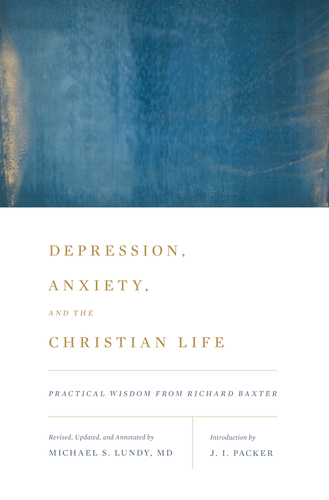Depression, Anxiety and the Christian: Practical Wisdom from Richard Baxter – Notes by Michael S. Lundy
 Stars: ****
Stars: ****
Crossway (2018)
Christian Living/Health – Mental Illness
192 pages
Disclosure: I received a copy of this book from Crossway in exchange for an honest review. This post contains affiliate links.
Summary: Depression—whether circumstantial and fleeting or persistent and long term—impacts most people at some point in their lives. Puritan pastor Richard Baxter spent most of his ministry caring for depressed and discouraged souls, and his timeless counsel still speaks to us today. In this book, psychiatrist Michael S. Lundy and theologian J. I. Packer present Baxter’s writings in order to comfort, instruct, and strengthen all who struggle with depression.
Who Was Richard Baxter?
Alive in the 1600s he was known as a Puritan. He was a preacher, physician and author. He was very wise and wrote about melancholy (what they called depression, anxiety and similar conditions at the time.)
About This Book
The book is separated into sections. Part 1 introduces the reader to Richard Baxter and gives history and information on his life and who he was. This is interesting and important to understand Part 2. Part 2 is his advice to those with depression and anxiety and similar conditions. The book is the words of Richard Baxter updated for the times so although some words may have been changed, the advice is the same. It’s hard to believe that Baxter understood mental illness so well in the 1600s when even the 1900s had some crazy ideas about it.
Obviously his advice is within the constraints of Christianity but I have to agree that embracing the faith really is healing as it’s healed me. I still have mental illness but I embrace my faith to keep it under wraps. Even the parts he mentions that aren’t specifically Christian make SO much sense.
Quotes
“Don’t be too preoccupied with your own thoughts. Do not take not too much notice of them. If Satan tosses in abusive thoughts, and if you are unable to cast them out, make light of them, and take less notice of them. Making a great deal of every thought that enters your mind will keep those thoughts in your mind longer. For what we are most aware of we think most about. What we least regard we least remember. If you want never to get rid of them, then keep paying attention to them and making too great a matter of them. ” – pg 94
“Do not trust your own judgment in your depressed and anxious condition, as to either the state of your soul or the choice and conduct of your thoughts or ways. Commit yourself to the judgment and direction of some experienced, faithful guide. In this dark, disordered condition, you are unfit to judge your own condition or the way to approach your duty. Your mind and imagination are either well or sick: if they are well, then what are these complaints about disturbances, confusion, and an inability to meditate and pray? If they are sick, then why will you be so conceited as to think yourself able to evaluate yourself while having such a disturbed imagination and thinking?” – pg 99
“When tormenting or blasphemous thoughts are thrust into your mind by Satan, don’t entertain them, and don’t be worried too much over them. First use your remaining reason and strength to resolutely dismiss them and turn your thoughts elsewhere. Don’t say to yourself, “I just can’t.” If necessary, find companions or engage in some activity that will divert you. What would you do if you were to encounter a deranged person in public shouting at you or loudly reviling God? Would you stand there and listen? Or argue with someone in that condition? Would you not leave and so avoid hearing or debating with such a person? So, in your case, when Satan feeds your mind ugly, despairing, or complaining thoughts, turn away from them to other thoughts or activities. If you are unable to do this on your own, speak to a friend when the temptation arises, and it will become the duty of your friend to divert you by other topics or by bringing you into the company of others. ” – pg 156
Buy Depression, Anxiety and the Christian Life from Amazon.com and help support the blog.








